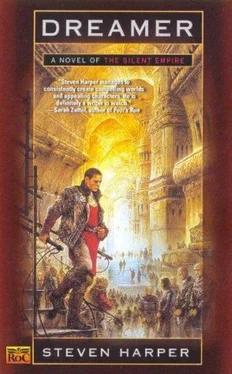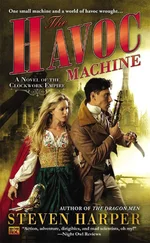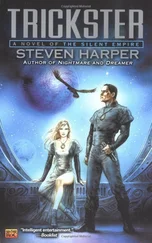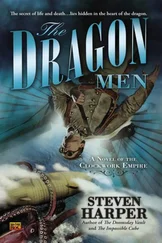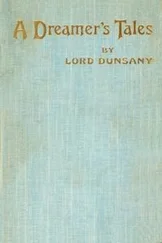Steven Harper - Dreamer
Здесь есть возможность читать онлайн «Steven Harper - Dreamer» весь текст электронной книги совершенно бесплатно (целиком полную версию без сокращений). В некоторых случаях можно слушать аудио, скачать через торрент в формате fb2 и присутствует краткое содержание. Жанр: Фантастика и фэнтези, на английском языке. Описание произведения, (предисловие) а так же отзывы посетителей доступны на портале библиотеки ЛибКат.
- Название:Dreamer
- Автор:
- Жанр:
- Год:неизвестен
- ISBN:нет данных
- Рейтинг книги:4 / 5. Голосов: 1
-
Избранное:Добавить в избранное
- Отзывы:
-
Ваша оценка:
- 80
- 1
- 2
- 3
- 4
- 5
Dreamer: краткое содержание, описание и аннотация
Предлагаем к чтению аннотацию, описание, краткое содержание или предисловие (зависит от того, что написал сам автор книги «Dreamer»). Если вы не нашли необходимую информацию о книге — напишите в комментариях, мы постараемся отыскать её.
Dreamer — читать онлайн бесплатно полную книгу (весь текст) целиком
Ниже представлен текст книги, разбитый по страницам. Система сохранения места последней прочитанной страницы, позволяет с удобством читать онлайн бесплатно книгу «Dreamer», без необходимости каждый раз заново искать на чём Вы остановились. Поставьте закладку, и сможете в любой момент перейти на страницу, на которой закончили чтение.
Интервал:
Закладка:
All the corridors were painted in bright, cheery colors. Murals and holograms in strategic places gave the illusion of space, and both were changed erratically to ease some of the day-to-day monotony. The base itself was a nest of domes and corridors that snaked in all directions. The layout followed no definite pattern, which had initially confused Prasad, but also served to keep monotony at arm’s length. And after seventeen years and a fair amount of silver hairs, Prasad knew every step. His footsteps were hushed by carpet, and the only sound was the faint creaking of ceramic bulkheads as they expanded and contracted under fluctuations in water temperature and density. Prasad ambled aimlessly, not really paying attention to where he was going.
A few minutes’ walk up several corridors and down two staircases brought Prasad to a door labeled Project Lab: Authorized Personnel Only. Prasad hesitated. He had more or less intended to visit the arboretum. His feet, however, had lead him here. Hesitantly, he touched his thumb to the plate mounted next to the door.
“Authorization accepted,” said the computer. “Good evening, Mr. Vajhur.”
Prasad stepped inside. Unlike the base itself, the lab was laid out more sensibly-a small grid of offices at the front, larger grid of locker rooms and labs behind them, and the Nursery behind that. Prasad passed his office and the laboratory area. Several of the lab doors were actually airlocks that bore such labels as “Bio-Hazard,” “Anti-Viral Protocols in Effect,” and “Clean-Suits Required for Entry.”
Prasad continued back to the Nursery. The door was triple-locked and fully a meter thick. He stared at it for a moment, then pressed his thumb to the plate and held it there. He heard the customary tiny hiss.
“Thumbprint and DNA verified,” said the computer. “Welcome, Mr. Vajhur.”
With a soft hum, the locks disengaged and the door swung open. Beyond lay a single long corridor. Prasad stepped inside and the door swung shut again.
The word “nursery” always conjured up wooden cradles, colorful books, and smiling rocking horses in Prasad’s mind. The Nursery, however, thoroughly failed to live up to this image. A main corridor, gray and uncarpeted, branched into several rooms. Prasad glanced into the first. A clear plastic barrier broken only by another heavy door divided the room in two. Four bassinets lined the wall on the other side of the barrier along with a changing table stocked with diapers and other infant supplies. No decorations or pictures graced the stark gray walls. No toys took up space beneath the beds. Instead, a cryo-unit lay below each, ready to receive the child in case of an emergency such as a bulkhead breach.
A collared slave woman sat in a rocking chair with a white bundle in her lap and a bottle in her hand. Prasad nodded to her, and she nodded back. He gestured at the bundle. The slave, who was in her late forties and dressed in a bright orange coverall, gently disengaged the bottle and held up the baby.
It looked perfectly normal for a newborn, though Prasad knew better. Somewhere in the lab’s network computer lay more information on that baby and its nursery-mates than on any other humans in history-DNA, RNA sequencing patterns, mitochondrial structure, brain development, source of DNA. Prasad would never, ever look up that information. He didn’t need it to perform his job, and he didn’t want to know which of the children had sprung from him.
The baby opened its mouth in protest at the interrupted feeding. The barrier woud have kept Prasad from hearing anything if there had been anything to hear. These babies never made a sound when they cried. The slave brought the infant back to her lap and plied the little bottle. Prasad moved on.
Further down the corridor was another room-and-barrier combination, though this one had five hospital beds in it with the side-rails raised. Toddler-sized bundles made lumps under the sheets, and Prasad had to look closely to see the motion of their breathing. Another female slave dozed in another rocking chair. A large medical supply cupboard lined the back wall, and various pieces of medical equipment lay waiting in the corners.
Prasad continued down the cool corridor, footsteps echoing slightly. At this hour no one bustled about. Dr. Say and Dr. Kri were almost certainly in bed, probably together. They pretended that there was nothing between them, of course, but everyone knew. The only ones up and on duty were the Nursery slaves. Prasad had initially been startled at the presence of slaves. Dr. Say, however, had explained that they could tell only as few people as possible about the lab’s location. Free people such as Prasad often had families and they wanted much higher payment to stay on an underwater base for months at a time. Slaves, however, cost the same whether they worked above the water or under it, and they didn’t have to be given time away from base. Shock collars ensured they didn’t revolt, and even if they did, there was no place for them to go unless they could hotwire a submarine.
Prasad’s feet carried him past four more rooms containing barrier, beds, and nurse, then halted at the last room of the Nursery corridor. With a grimace, Prasad realized this was where he had been intending to come all along. This room was the largest yet, with eighteen occupied beds. Five slaves, burly and muscular, stood careful guard. The black-haired figures on the beds were strapped in. Atrophied muscles and tendons shortened from disuse made their limbs thin and withered-looking, with claw-like hands that curled under their chins. The fingers twitched like epileptic insects. Prasad stared at them, expressionless, and even as he watched, one of the children opened its eyes. Its head and shoulders came forward as far as the straps would allow, and its mouth twisted open. The neck spasmed, jerking the head about, and a dark tongue quivered between stretched lips. Saliva dribbled down its chin. The barrier was sound-proofed, though Prasad knew that despite the fact that the child looked like it was screaming, it was absolutely silent.
Silent. Prasad stared, ignoring the sidelong glances of the guards. The children were silent and Silent. They-Prasad, Dr. Say, and Dr. Kri-had made them that way. Everyone knew that a Silent fetus had to come to term in a living mother’s womb. It didn’t matter what species the being might be, and it didn’t matter what technology anyone tried as a substitute for a living mother’s voice or heartbeat. Silent fetuses grown in artificial wombs invariably withered and died. Most people assumed that the Silent were, on some level, aware of the minds around them, and the presence of the mother’s mind was crucial.
Until the lab came along. When Prasad first met them, Dr. Say and Dr. Kri had barely begun their research, but they had already made several advances. It was simply a matter of brain chemistry. A developing fetus did not actually have to have its mother’s mind nearby-it only needed to think its mother was nearby.
“All sensation and memory,” Dr. Kri had said in his rich, mellow voice, “is nothing but a series of chemical patterns stored in the brain. All we have to do is figure out which chemical pattern the brain of a live-womb fetus creates when it senses its mother nearby, create that chemical sequence ourselves, and transplant it into the brain of a machine-womb fetus.”
It hadn’t been that simple, of course. Genetic codes-and therefore chemical patterns-varied from fetus to fetus, which meant creating a series of genetically identical embryos. There was also the fact that some gene combinations seemed to thrive better than others. Learning these combinations had taken several years and many failed fetuses. There was also the problem of chemical delivery. They experimented with direct site delivery using microscopic chemical packs slipped into hijacked white blood cells, but in the end, it had been easiest to produce a retrovirus that would bond with-and change-the neural DNA itself, forcing the cells to create their own memory codes.
Читать дальшеИнтервал:
Закладка:
Похожие книги на «Dreamer»
Представляем Вашему вниманию похожие книги на «Dreamer» списком для выбора. Мы отобрали схожую по названию и смыслу литературу в надежде предоставить читателям больше вариантов отыскать новые, интересные, ещё непрочитанные произведения.
Обсуждение, отзывы о книге «Dreamer» и просто собственные мнения читателей. Оставьте ваши комментарии, напишите, что Вы думаете о произведении, его смысле или главных героях. Укажите что конкретно понравилось, а что нет, и почему Вы так считаете.
